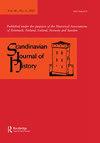In Defence of Danish Writers. The Daily Workings of the Press Bureau; or the Struggle for Sovereignty, 1940–1943
IF 0.8
3区 历史学
Q1 HISTORY
引用次数: 0
Abstract
ABSTRACT This article investigates the way in which cultural censorship was practiced in Nazi-occupied Denmark, focusing on the Danish Press Bureau’s censorship of books in the period 1940–1943. From April 1940 to August 1943, the explicit German acceptance of Denmark as an independent state constituted a certain degree of internal sovereignty; often referred to as the illusion of sovereignty in Danish historiography. On the basis of new empirical studies and records of the Press Bureau, and with particular emphasis on two significant cases, this article argues that this illusion of sovereignty had an impact on the Danish administration of censorship, and it demonstrates the importance within the Press Bureau of maintaining the outward show of sovereignty. The article reveals that the formal political setting of the occupation had real administrative implications in negotiating with the German occupier in the sense that Danish authorities within the Press Bureau to some extent acted autonomously and even challenged direct German orders in relation to censorship. In doing so, the Press Bureau succeeded in defending Danish writers against further German pressures in some cases, which adds new insights regarding the peculiar form of political sovereignty that was constituted in Denmark.为丹麦作家辩护。新闻局的日常工作;或1940年至1943年的主权斗争
本文以1940-1943年期间丹麦新闻局对图书的审查为研究对象,考察了纳粹占领时期丹麦文化审查制度的实施方式。从1940年4月到1943年8月,德国明确承认丹麦是一个独立的国家,这构成了一定程度的内部主权;在丹麦史学中通常被称为主权幻觉。在新的实证研究和新闻局记录的基础上,并特别强调两个重要的案例,本文认为,这种主权幻觉对丹麦的审查管理产生了影响,并证明了在新闻局内部保持主权的外在表现的重要性。文章揭示,占领的正式政治背景在与德国占领者谈判时具有真正的行政影响,因为新闻局内的丹麦当局在某种程度上自主行事,甚至在审查方面挑战德国的直接命令。在这样做的过程中,新闻局在某些情况下成功地保护了丹麦作家免受德国的进一步压力,这使人们对丹麦形成的政治主权的特殊形式有了新的认识。
本文章由计算机程序翻译,如有差异,请以英文原文为准。
求助全文
约1分钟内获得全文
求助全文
来源期刊

SCANDINAVIAN JOURNAL OF HISTORY
HISTORY-
CiteScore
1.10
自引率
20.00%
发文量
33
期刊介绍:
Scandinavian Journal of History presents articles on Scandinavian history and review essays surveying themes in recent Scandinavian historical research. It concentrates on perspectives of national historical particularities and important long-term and short-term developments. The editorial policy gives particular priority to Scandinavian topics and to efforts of placing Scandinavian developments into a larger context. Studies explicitly comparing Scandinavian processes and phenomena to those in other parts of the world are therefore regarded as particularly important. In addition to publishing articles and review essays, the journal includes short book reviews. Review essay proposals and polemical communications are welcomed.
 求助内容:
求助内容: 应助结果提醒方式:
应助结果提醒方式:


